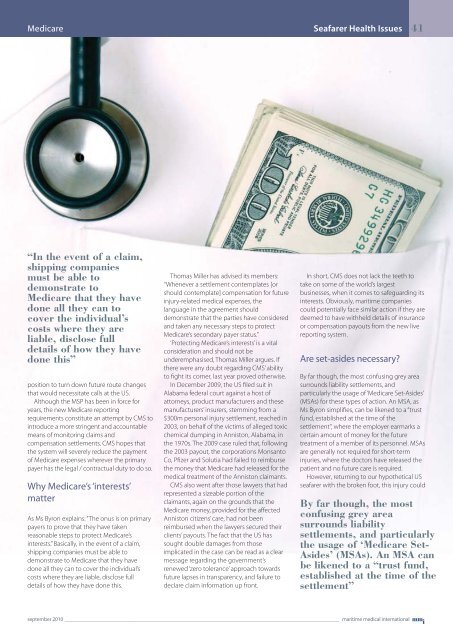Create successful ePaper yourself
Turn your PDF publications into a flip-book with our unique Google optimized e-Paper software.
Medicare Seafarer Health Issues 41<br />
“In the event of a claim,<br />
shipping companies<br />
must be able to<br />
demonstrate to<br />
Medicare that they have<br />
done all they can to<br />
cover the individual’s<br />
costs where they are<br />
liable, disclose full<br />
details of how they have<br />
done this”<br />
position to turn down future route changes<br />
that would necessitate calls at the US.<br />
Although the MSP has been in force for<br />
years, the new Medicare reporting<br />
requirements constitute an attempt by CMS to<br />
introduce a more stringent and accountable<br />
means of monitoring claims and<br />
compensation settlements. CMS hopes that<br />
the system will severely reduce the payment<br />
of Medicare expenses wherever the primary<br />
payer has the legal / contractual duty to do so.<br />
Why Medicare’s ‘interests’<br />
matter<br />
As Ms Byron explains: “The onus is on primary<br />
payers to prove that they have taken<br />
reasonable steps to protect Medicare’s<br />
interests.” Basically, in the event of a claim,<br />
shipping companies must be able to<br />
demonstrate to Medicare that they have<br />
done all they can to cover the individual’s<br />
costs where they are liable, disclose full<br />
details of how they have done this.<br />
Thomas Miller has advised its members:<br />
“Whenever a settlement contemplates [or<br />
should contemplate] compensation for future<br />
injury-related medical expenses, the<br />
language in the agreement should<br />
demonstrate that the parties have considered<br />
and taken any necessary steps to protect<br />
Medicare’s secondary payer status.”<br />
‘Protecting Medicare’s interests’ is a vital<br />
consideration and should not be<br />
underemphasised, Thomas Miller argues. If<br />
there were any doubt regarding CMS’ ability<br />
to fight its corner, last year proved otherwise.<br />
In December 2009, the US filed suit in<br />
Alabama federal court against a host of<br />
attorneys, product manufacturers and these<br />
manufacturers’ insurers, ste<strong>mmi</strong>ng from a<br />
$300m personal injury settlement, reached in<br />
2003, on behalf of the victims of alleged toxic<br />
chemical dumping in Anniston, Alabama, in<br />
the 1970s. The 2009 case ruled that, following<br />
the 2003 payout, the corporations Monsanto<br />
Co, Pfizer and Solutia had failed to reimburse<br />
the money that Medicare had released for the<br />
medical treatment of the Anniston claimants.<br />
CMS also went after those lawyers that had<br />
represented a sizeable portion of the<br />
claimants, again on the grounds that the<br />
Medicare money, provided for the affected<br />
Anniston citizens’ care, had not been<br />
reimbursed when the lawyers secured their<br />
clients’ payouts. The fact that the US has<br />
sought double damages from those<br />
implicated in the case can be read as a clear<br />
message regarding the government’s<br />
renewed ‘zero tolerance’ approach towards<br />
future lapses in transparency, and failure to<br />
declare claim information up front.<br />
In short, CMS does not lack the teeth to<br />
take on some of the world’s largest<br />
businesses, when it comes to safeguarding its<br />
interests. Obviously, maritime companies<br />
could potentially face similar action if they are<br />
deemed to have withheld details of insurance<br />
or compensation payouts from the new live<br />
reporting system.<br />
Are set-asides necessary?<br />
By far though, the most confusing grey area<br />
surrounds liability settlements, and<br />
particularly the usage of ‘Medicare Set-Asides’<br />
(MSAs) for these types of action. An MSA, as<br />
Ms Byron simplifies, can be likened to a “trust<br />
fund, established at the time of the<br />
settlement”, where the employer earmarks a<br />
certain amount of money for the future<br />
treatment of a member of its personnel. MSAs<br />
are generally not required for short-term<br />
injuries, where the doctors have released the<br />
patient and no future care is required.<br />
However, returning to our hypothetical US<br />
seafarer with the broken foot, this injury could<br />
By far though, the most<br />
confusing grey area<br />
surrounds liability<br />
settlements, and particularly<br />
the usage of ‘Medicare Set-<br />
Asides’ (MSAs). An MSA can<br />
be likened to a “trust fund,<br />
established at the time of the<br />
settlement”<br />
september <strong>2010</strong> ________________________________________________________________________________________________________ maritime medical international


